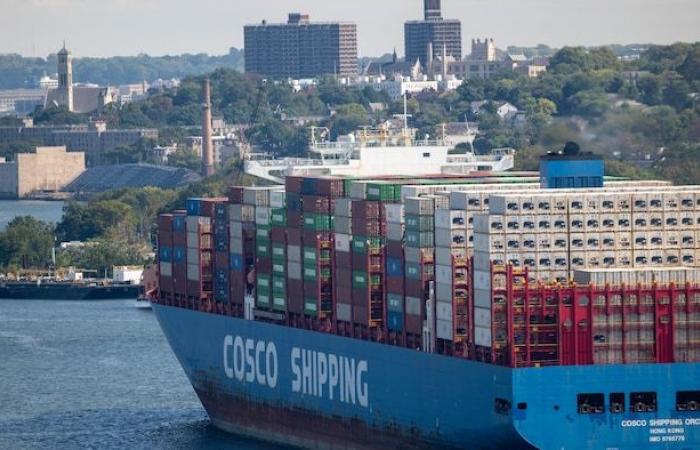Since Tuesday morning, the strike of American longshoremen has disrupted maritime transport on the east coast of the United States, causing delays in the processing of goods which could soon give rise to product shortages and sharp price increases, if the conflict is not resolved quickly.
These shortages will of course have repercussions in Canada, which has very close trade and supply relations with the United States.
Remember that the walkout affects all ports on the east coast, from Maine to Texas.
All products, from fruits and vegetables to imported vehicles and electronic equipment, could be affected by this strike led by American longshoremen.
Open in full screen mode
Boise Butler, president of Local 1291, with an American flag on his wheelchair, holds a picket line with his fellow longshoremen outside the Packer Avenue Marine Terminal in Philadelphia, October 1, 2024.
Photo : Associated Press / Ryan Collerd
The union International Longshoremen’s Association (ILA), which represents 45,000 workers, took the decision to strike for higher wages after negotiations with the ILA employers group failed.United States Maritime Alliance (USMX).
The experts consulted by CBC News generally agreed that Canadian consumers are expected to feel the impact of the strike, which will cut U.S. shipping in half and is expected to cost the U.S. economy billions of dollars a day.
A disruption at these ports has a considerable impact on the supply chain and, more generally, on the availability of these goods in Canada.
Food, Retail and Cars
According to Mr. Chan, the strike will have a particular impact on the importation of perishable goods, particularly products that are not grown in Canada or which are not in season, and which risk being less available or becoming more expensive .
Retail supply is also a concern ahead of the busy Christmas period, Chan noted.
Anything that significantly disrupts transportation infrastructure in the United States has repercussions on the global economy, and this is especially true here in Canada, given the importance of bilateral trade and supply chains. deeply integrated supply chain between our two countries
adds Pascal Chan.
Open in full screen mode
A container ship leaves the Port of Newark for the Atlantic Ocean, September 30, 2024. (File photo)
Photo : Getty Images / Spencer Platt
I think we will start to feel it very, very quickly, either in shortages of goods or in prices. If we are unable to get what we need, cost pressures will increase for many of these products.
The automobile industry will also be affected. Those who ordered cars manufactured abroad will be the first to feel the effects, and spare parts will be affected soon after, said Flavio Volpe, president of the Association of Automobile Parts Manufacturers.
East Coast ports serve all automobile manufacturers imported into Canada, according to Mr. Volpe.
Some companies have also informed their customers that they will charge a surcharge on future shipments due to these delays.
Costly penalties
Container shipping giant Maersk, for example, said it would introduce a disruption surcharge of up to US$3,780 per container, while shipper MSC said it would apply a disruption surcharge. emergency up to US$3,798 per container.
Asked about the cost of these delays at the microphone of the show All one morningon ICI Première, Pierre Dolbec, CEO of Dolbec International, explains that importers and shipping companies must pay penalties when their containers clog up ports and landing stages.
When we have a container that enters [au port]we have five working days – given by the shipping lines – to collect the container, clear it through customs, transport it, unload it and return it to the terminal concerned. If you have not managed to do this within five days, you have penalties, what we call “demurrage”. [surestarie, NDLR] or detention
he explains.
That’s about $500 USD per day. It depends on the 20 feet or the 40 feet. So that means that if, for example, I have 18 days of catching up to do […] starting I have 13 days where I will pay $500. I didn’t do anything there. I didn’t clear it, I didn’t transport it, I didn’t deliver it.
According to Mr. Dolbec, a day of strike at the port of Montreal, where a 72-hour walkout must end Thursday morning, represents approximately 6 days to make up for lost time on delivery times.
So that means that even if the strike ended tomorrow morning or the day after tomorrow, we would have about 18 to 20 days of work to succeed in making up all the lost time.
Perishable foods
As the majority of food products from the South land in American ports, Canadians may soon have to deal with a shortage of certain fruits and vegetables, notably pineapples and bananas, said Fraser Johnson, professor of operations management. at Western University in London, Ontario.

Open in full screen mode
Fruits and vegetables from the South such as mangoes, pineapples or bananas, for example, mainly pass through American ports on the east coast.
Photo : Radio-Canada / Ivanoh Demers
Nearly 80% of bananas shipped to the United States pass through the East Coast
he recalls.
If the situation continues, we may see shortages of products, consumer goods, clothing, electronics and automobiles shipped to North America.
Anthony Formusa, president of the fruit and vegetable importer and distributor National Produce Marketing Inc., says some of its pineapples and mangoes are already stuck in shipping limbo.
Given that perishable goods cannot languish in ports for very long, this strike is likely to represent significant losses for food importers as delayed shipments will have to be thrown away.
Since the Port of Philadelphia is partly untouched by the strike – some of its workers are represented by a separate union – several distributors of Canadian produce are not faring too badly for the moment.
This is the case of Bondi Producethe largest distributor of fresh foodservice products in Ontario, which only anticipates minor disruptions, according to its vice-president Matt DuPerrouzel. The company makes more than 1000 deliveries per day.
I would say 90% of our product, especially during the offshore fishing season, will come into the Port of Philadelphia. This is one of the main production centers we use in North America. The company expects only a marginal price increase
believes Mr. DuPerrouzel.
With information from Jenna Benchetrit








